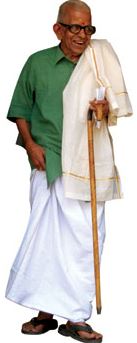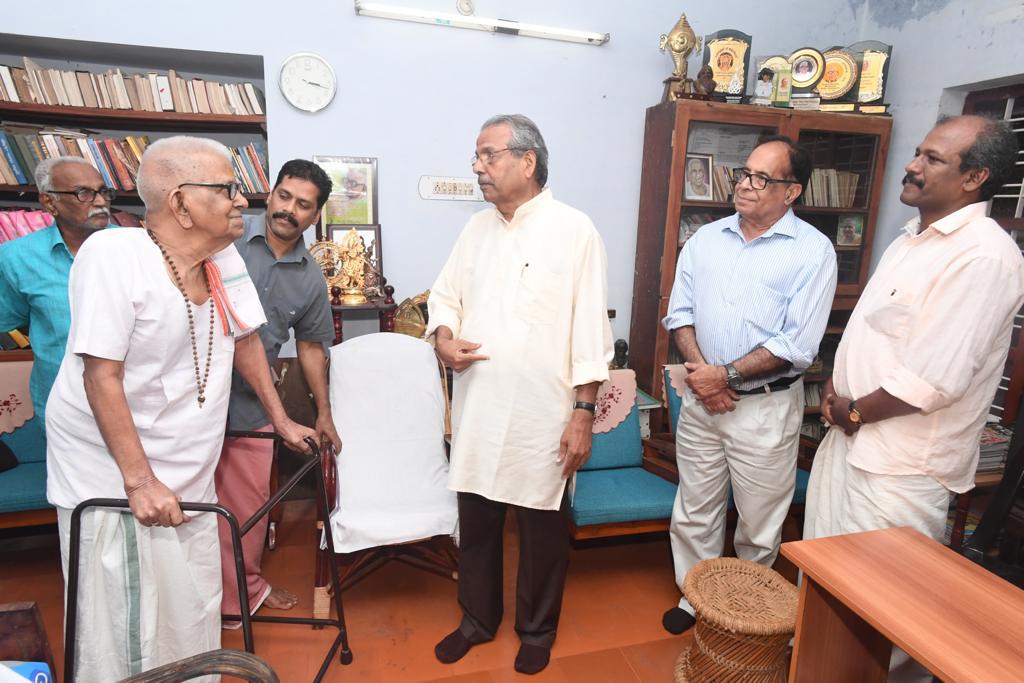|
Man as I am, even my breasts swelled up
And flowed towards all living beings This is quintessential Akkitham. Love towards all things great and small has remained his ideal. Wasn’t he barely twenty-five when he wrote – “Absolute love would, / in course of time turn into strength. / This is beauty, this alone is truth/ And practicing it one’s utmost duty”. Many are such revelations in Akkitham’s poetry. But Akkitham avers that he never consciously strived for such insights, they always visited him, Indeed, he claims it is not he who writes, but someone within. No wonder, his poetic career spanning over sixty years, does not lend itself for easy evaluation. |
|
|
Akkitham is considered one of the harbingers of modernity in Malayalam literature. He literally burst into the literary scene with his celebrated Irupatham Noottandinte Ithihasam (Saga of the Twentieth Century), a poem that brought him not only bouquets and brickbats but also widespread acclaim as a profoundly contemplative poet.He went on to publish 46 poetry collections, several essays and short stories including such major works as Balidarsanam, Arangettam, Nimishakshethram, Idinju Polinja Lokam andAmrthaghatika. He had translated Srimad Bhagavatham, a work spread over 2,400 printed pages.Nambbodiri, one of the prominent living poets in Malayalam, is profoundly contemplative. His poetry reflects Indian philosophical and moral values as represented by Upanishads or by modern thinkers like Mahatma Gandhi. Bharatiya Jnanpith said Nambbodiri is a poet of rare integrity and suggestive power and the author of many works, all considered classics.
Akkitham is his family name. There were no issues in this ancient family of Vedic scholars and he was born as a result of propitiating many gods. He was named Achuthan. Patriarchs of the family naturally wished that Achuthan would turn into a great Vedic scholar. When he was eight, he was initiated by his father into learning Rigveda. Amazingly, he started writing Malayalam slokas in Sanskrit meters around that time. But his heart lye in drawing sketches and painting- a skill he would put to great advantage in his writing later. He joined the college after passing the matriculation examination: but did not continue his studies further. Poetry sustained him all these years. But it was his meeting with the legendary poet Edassery Govindan Nair (1906-74) that gave a new direction to his poetic pursuits. Akkitham gratefully regards Edasseri as his mentor and maintains that it was Edasseri’s ruthless tutoring that helped him grow into a poet. His first collection of poem came out in 1946. Three years later he got married; he celebrated it with another book of poems. Predictably, he started writing against the evil practices of his community with a reformatory zeal. Those were the days when communist ideology was taking roots in Kerala. E.M.S. Nampoothiripad, with whom he had longstanding familial ties, was the writing primers on socialism and communism, Akkitham was initially drawn to communism by these writings. But, curiously, it was the Rig-Veda that reaffirmed his faith in communism. Akkitham was initially drawn to communism by these writings. But, curiously, it was the Rig-Veda that reaffirmed his faith in communism. Akkitham asserts that the Samvaada Sookta of Rig-Veda which talks about the communism of minds is the first instance of proto-communist literature. He turned a fellow-traveler and remained so far nearly seven years, form 1943 to 1949.
Akkitham had by then established himself as a poet of repute. He had published many books of poems including a narrative poem depicting the story of an agrarian struggle. “The Wet Clod”. Wet by the blood of agricultural laborers shot dead by the police. He was also well known as a social activist. It was easy to graduate from Samvaada Sookta to communism. But it was difficult to come to terms with the theory of class war. Gandhi’s hold on him was too great to be shaken off and would not allow a continuing relationship with the party, which, anyway, was very ambiguous; he never became an official member- “I couldn’t make myself believe that the purpose of my life was to become a member of the party founded by V.I Lenin”. Probably it was the Calcutta Thesis calling for armed revolution which settled the issue for him. Probably it was the death of his first- born which turned him towards spiritualism. He chose to publicly recant his faith in communism. Initially he wrote three stanzas and thought it was all over. As I shed a tear for others, There rise within me a thousand suns. As I expend a smile for others, Shines within me a full moon, eternal and serene. I never knew of this heavenly bliss before; Lamenting over that great loss again and again I weep. These stanzas now preface the poem. ” The Epic of the Twentieth Century”, just short of eight hundred lines in length in the epic metre, divided into four cantos. Written as the confession of a repentant communist, Akkitham waited for many months before he sent it to press. Finally it was at the behest of Edassery that he published it in the premier journal Mathrabhumi in August 1952. That was the time many intellectuals all over the world- Andre Gide, Arthur Kestler and Stephen Spender, to name a few were talking about the “God the failed”. Here was Akkitham Independently essaying on the basic impiety of communism. Arguably, ‘Epic is the first major poem in Malayalam which was opposed on political terms. And what is generally true of classics, applies to “Epic” as well it is hardly read in entirety. Again, as in the case of many classics, some couplets tend to out shadow and outweigh the poem itself. Here is such a one- Sobbing. I told this to the future citizen- “Light, O young one! Is sorrow; Darkness is pleasurable”. This is one of the most quoted couplets form modern Malayalam poetry. It would appear as though it has flown away from the appointed space in the poem and perched itself in totally different discursive spheres. Ranging from everyday speech to political cartoons, gaining in contra signification. For the poet’s detractors it has come in handy as a stick to beat him with, as a stick to beat him with, as an evidence of his alleged regressive socio-political stance. Acquiring the status of an aphorism, it has now become the bane of the poet, dubbing him as an ‘enemy of the people!’ But Akkitham was primarily concerned about these people. People who unsuspectingly fell victims to the designs of the party and its leaders. People who laid down their lives in the ‘war of liberation’. He was basically opposed to the inherent element of violence. Vengefulness, he asserted, cannot ever give birth to peace and happiness. Akkitham believes that, over the last fifty years, ground realities of international polity have proved him right. The poem has gained in eternal relevance considering the ideological metamorphosis the party itself has undergone. It would now seem that there are no points of serious divergence between what Akkitham wrote and the party now professes. It is not just with the red flag and the rosary beads that Akkitham tussled. The disparateness of what he learnt by rote and what he actually confronted-With the mouth that chanted the vedic hymns, I was made to swallow / nauseating fish and meat, the irreconcilable swallow value systems of the village and the city- The city throbbing all around / turned me into another being, such opposites are srewn all over his poetry which lends an ever-habiting tension to is poetry and enlarges its spectrum. How he metamorphosed form the assertion. My tongue shall hence forth chant no names of gods to the exhortation, O tongue! Ruthlessly fill the barrenness of skies with god’s names has to be seen to be believed. So is the way he untiringly tries to link ancient Indian wisdom to modern science and technology regardless pleads for the ‘revivalist’ abuses showered on him indeed he unabashedly pleads for the revival of the Indian languages and the resurrection of Sanskrit. Tradition, for him, is no fossil; it needs to be purposefully integrated into the modern times. So is it with the poetic tradition. In one of the finest poems written in Malayalam on kalidasa, ‘The External Cloud’, he seeks to redefine the role of tradition. In numerous poems he problematises the dichotomy between faith and reason- Why wear the scared thread?, What signifies a Brahmin?, Talking of Brahminism, Akkitham approached the problem of removing untouchability more as the consummation of his all-encompassing love than as a social reformation measure. He wrote about the untouchables not o account of a need to politically correct but because of his spiritual communion with them. He would be in the forefront of organizing yagas;but will not swerve from the ideal of popularizing Vedic studies among non Brahmins. Even the stupendous work of translating the Bhagavata into Malayalam was aimed at making it intelligible to all. Culture is no preserve forest for him. Sex, parenthood, family every aspect of life is a cause for celebration in Akkiyham’s poetry. The farmer’s slang and the heightened sanskritises poetic diction of the Vedas he embraces alike. Both folk tunes and intricate Sanskrit metres occur to him naturally. So do sonnets and muktakas. Some of the finest children’s verse in Malayalam is written by Akkitham .So will you find some of the best allegoric contemplative poetry in his oeuvre. Judge him in terms of verbal felicity, ease and abundance or by the parameters of copiousness, variety and subtlety, Akkitham would score on all counts. But most probably his fame would eternally rest not on these accomplishments. Most likely it would rest on the limitless compassion reflecting in his poems compassion for children, compassion for the disabled, compassion for the underprivileged. Tears of this compassion irrigate his poetic landscape. Indeed the teardrop, around which he has woven new myths, is a major motif of his poetry. Tears are nothing but life-giving water. Water and not fire, is Akkitham’s basic element. It cannot be otherwise with a poet who wrote about the failure of a much acclaimed revolution. - By Atmaraman |
|

